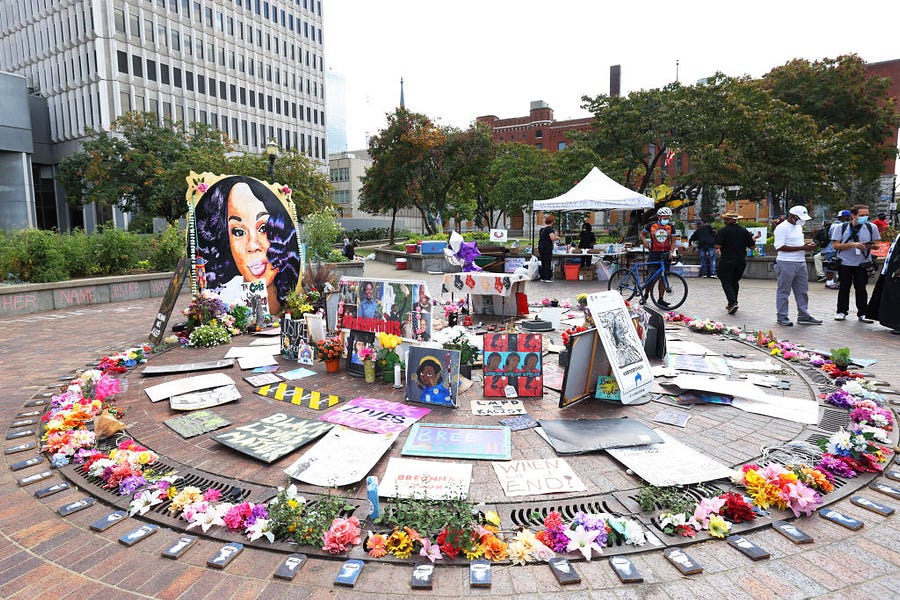Yesterday a grand jury in Kentucky refused to charge the officers who killed Breonna Taylor. This result was both lawful and deeply unjust. Let me explain why.
In August, I wrote an extended newsletter called “Supreme Court Precedent Killed Breonna Taylor.” It was a bold headline and a bold claim, but both were justified. The court’s precedent had created the legal cover for police tactics that placed police and lawfully armed citizens on a violent collision course—one that has resulted in tragic deaths before, and (unless the law is changed) will result in tragic deaths again.
I don’t want to rehash the entire argument, but the essence is this: In a series of opinions reaching back more than two decades, the Supreme Court has permitted the use of no-knock police raids not just to preserve life, but also to preserve evidence. It has also granted officers specific legal privileges even when they’ve violated citizens’ constitutional rights, including, a) exemptions from the exclusionary rule (which blocks the use of unlawfully obtained evidence in criminal trials) for raids that violate knock-and-announce requirements and, b) exemptions from attempts to impose heightened obligations for the use of force when officers are violating the Fourth Amendment by unlawfully intruding in a citizen’s own home.
Police departments across the country have taken advantage of this wide latitude. They’ve sought no-knock warrants liberally. They’ve blurred the line between no-knock and knock-and-announce with “quick knock” practices. And they’ve engaged in surprise, late-night violent entries into private dwellings for the sole purpose of preserving evidence.
Now, let’s compare this line of precedent with a different series of laws, including a key SCOTUS case. In District of Columbia v. Heller, the court held that citizens have an individual constitutional right to keep a handgun in their home for their personal defense. Other states, including Kentucky, go farther and have enacted laws recognizing the so-called “castle doctrine” and stand-your-ground laws. At the risk of oversimplifying these doctrines, they in general hold that a person does not have a duty to retreat when he is lawfully present in a place and he reasonably believes he faces an imminent threat of death or serious bodily harm.
To be clear, castle doctrine statutes often explicitly state that individuals do not have the right to shoot police officers who attempt to enter a dwelling in the pursuit of their official duties, but there’s a caveat—the person prohibited from “using force” must know or “reasonably should have known” that the person entering was a cop.
Do you see how these doctrines create virtually inevitable armed clashes? In the darkness and confusion of a violent entry, a homeowner may not know who is charging straight into his house. If he can’t reasonably and immediately (we’re talking about mere seconds at issue) know that he’s facing police officers executing a warrant, he has a right under the law to open fire.
At the same time, when the police are performing their official duties—even if they’re at the wrong house or even if the warrant itself is unlawful—they also have the right to open fire if they reasonably perceive a mortal threat. Thus, a gun battle can commence with both parties acting completely lawfully.
Is this what happened in Breonna Taylor’s case? It appears so.
Thanks to extraordinary reporting from the New York Times’s Rukmini Callimachi, we now have a much better picture of what happened on the terrible, fatal early morning hours of March 13, 2020. Let’s break down the key elements step-by-step.
1. The police obtained a no-knock warrant to raid Taylor’s apartment based on allegations thata suspected drug dealer named Jamarcus Glover had received packages at Taylor’s home (Glover and Taylor had a previous relationship). The police sought the no-knock warrant out of a desire to preserve evidence.
2. Before the warrant was served, the police were directed to knock and announce rather than execute the warrant without knocking. At approximately 12:40 a.m. on March 13, the police pounded on Taylor’s door. Taylor was inside with her boyfriend, Kenneth Walker. He lawfully possessed a handgun.
3. At this point the facts are in dispute. Police claim that they knocked and announced they were police. A witness corroborates this account, but other witnesses dispute it, claiming they never heard the cops identify themselves. Walker claims that he was startled by the pounding, asked who was there, never heard a response, and was worried that it might be Glover. So he grabbed his gun.
4. The police then broke down the door to enter the apartment. Walker and Taylor saw them in the darkness, and Walker fired a single shot, striking one officer in the leg, severing his femoral artery and gravely injuring him. Under the available evidence (Walker hadn’t heard the police identify themselves and unknown individuals were violently entering his home), Walker had a legal right to shoot at the intruders, even if they were police.
5. At the same time, the instant the officers saw that Walker was pointing his gun at them—and certainly when he pulled the trigger—they had their own legal right to shoot back. They were performing their official duties, and an armed man was quite plainly placing them in immediate, mortal danger.
6. They did not, however, have the right to use indiscriminate force. Two officers fired directly at Walker. They hit Taylor, who was standing nearby. But given the proximity of Taylor to Walker, it would be virtually impossible to prove that the officers’ startled response—aimed directly at the perceived threat—was reckless enough to be criminal.
7. There was, however, a third police officer who fired, and he fired his weapon irresponsibly. The grand jury properly indicted former detective Brent Hankison for “wanton endangerment.” I say “former” because the Louisville Metro Police Department had already fired him for showing “extreme indifference to the value of human life.”
As the New York Times reported, “Hankison fired into the sliding glass patio door and window of Ms. Taylor’s apartment building, both of which were covered with blinds, in violation of a department policy that requires officers to have a line of sight. Some of the bullets entered a nearby apartment where a pregnant woman, her husband and their 5-year-old child were asleep.”
At his news conference explaining the grand jury’s decision, Kentucky Attorney General Daniel Cameron declared that “Justice is not often easy.” He said it “does not fit the mold of public opinion, and it does not conform to shifting standards.”
This is certainly correct, but it’s incomplete. The grand jury’s decision was proper, but the laws that led the police to violently enter Taylor’s home and confront her armed boyfriend in the middle of the night are unjust. The practices of the Louisville police department capitalizing on those laws are also unjust. The Washington Post’s Radley Balko has done indispensable work following this case, and these three paragraphs from his most recent piece simply sting:
The most serious questions here concern the investigation itself, and why these officers were asked to serve a warrant on Taylor’s home in the first place. … There is the fact that despite the surveillance on Taylor’s home, the police didn’t know there was another person inside. There are the police bullets that were inadvertently fired into surrounding apartments. There’s the cut-and-paste language used to secure the no-knock portion of the warrant. There’s also the fact that the officer who procured the warrant was not part of the raid team. There’s the fact that five officers involved in the Taylor raid were involved in another violent, botched raid on an innocent family in 2018.
And there’s the 2015 study by criminologist Bryan Patrick Schaefer, who was allowed to embed himself with the Louisville police department. As Schaffer [sic] wrote, “Of the 73 search warrant entries observed, every entry involved using a ram to break the door down. Further, the detectives announce their presence and purpose in conjunction with the first hit on the door. A detective explained, ‘As long as we announce our presence, we are good. We don’t want to give them any time to destroy evidence or grab a weapon, so we go fast and get through the door quick.‘”
Schaefer added that in the raids he observed, the difference between how police served a no-knock warrant and a knock-and-announce warrant was “minimal in practice.”
In the contest between the rights of a woman to sleep peacefully in her own home and for her boyfriend to defend it against violent entry and the right of the state to make a violent entry, the law should prefer the homeowner. No, that doesn’t mean removing from police the ability to defend themselves. It means dramatically restricting their ability to make a violent entry in the first instance. It means revitalizing the Fourth Amendment, and reviving its importance in our constitutional republic. “The right of the people to be secure in their persons, houses, papers, and effects, against unreasonable searches and seizures, shall not be violated, and no Warrants shall issue, but upon probable cause, supported by Oath or affirmation, and particularly describing the place to be searched, and the persons or things to be seized.”
Yesterday, the grand jury correctly applied the law to the facts, and its decision not to charge the officers who fired the fatal shots was almost certainly correct. But Breonna Taylor’s death was still deeply unjust, and the injustices will continue until the law is reformed.
One last thing …
Yesterday I had a great time recording our first Advisory Opinions Live with my brilliant co-host, Sarah Isgur. She interviewed me about my new book, Divided We Fall. If you missed it, you can click through to watch it below, and if you’ve already bought the book and had a chance to start reading, give me your thoughts in the comments!

Photograph by Michael M. Santiago/Getty Images.







Please note that we at The Dispatch hold ourselves, our work, and our commenters to a higher standard than other places on the internet. We welcome comments that foster genuine debate or discussion—including comments critical of us or our work—but responses that include ad hominem attacks on fellow Dispatch members or are intended to stoke fear and anger may be moderated.
With your membership, you only have the ability to comment on The Morning Dispatch articles. Consider upgrading to join the conversation everywhere.